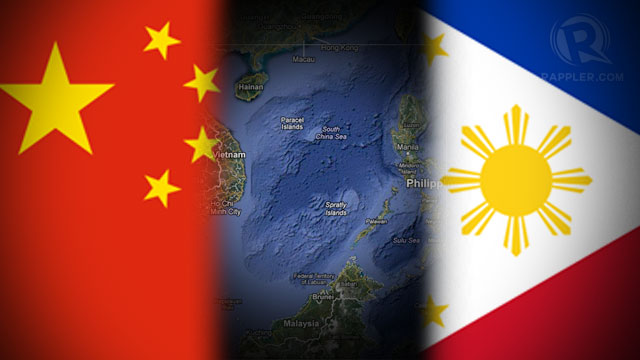SUMMARY
This is AI generated summarization, which may have errors. For context, always refer to the full article.

MANILA, Philippines – China remains convinced that a bilateral negotiation, and not international arbitration, is the best way to settle its territorial dispute with a “good neighbor” and long-standing “friend” like the Philippines.
“A resort to arbitration does not meet people’s expectations for friendship in both China and the Philippines,” said Zhang Hua, spokesperson of the Chinese embassy in Manila, in a statement sent to the media on Thursday, April 2.
In the lengthy statement, Zhang explained why China rejected the pleading filed by the Philippines with an arbitral tribunal against the country’s claim on the West Philippine Sea (South China Sea).
Watch the report below.
“For the Chinese people, to avoid lawsuit is part of the Chinese culture and tradition. And the Philippine people also value friendship and good faith. We see every reason for both sides to sit down and resolve problems through negotiations instead of taking the issue to court,” he said.
Zhang said that the ties between the countries have a “long and profound history and enjoys strong and extensive public support” which “also meets the practical need for both countries to pursue common development.”
“Territorial and maritime disputes are not the entirety of the China-Philippines relationship. The underlying trend of this relationship remains good-neighborliness and friendship,” Zhang said.
Direct negotiation vs arbitration
He reiterated China’s commitment to resolve its disputes with the Philippines through bilateral negotiations – a position it has consistently taken in discussions on the West Philippine Sea issue in international fora, especially in dialogues with the Association of Southeast Asian Nations (ASEAN).
“China is committed to resolving its disputes with the Philippines through bilateral negotiations. China and the Philippines have between them territorial and maritime disputes. And it is just natural that disputes might exist between neighbors. What is important is how to resolve the disputes,” Zhang said.
He sought to highlight the benefits of “direct negotiation between countries” in dispute resolution compared to international arbitration.
“Negotiations may well take time, but agreement reached through negotiations is acceptable to both parties, and is hence the most equitable and durable. International justice or arbitration is one way of settling international disputes, but it does not offer a solution to all problems,” Zhang said.
He said that unlike the “durable” outcome of bilateral negotiations, “there have been quite a number of cases where international judicial or arbitral bodies passed a ruling, but relevant issues still remained unresolved.”
Zhang stressed that China is steadfast in its decision against arbitration.
“I would like to emphasize that China’s stance of neither accepting nor participating in the arbitration does not change and will not change. Forcing the arbitration is not conducive to the settlement of the disputes on the South China Sea between China and the Philippines,” Zhang said.
He said the move taken by the Philippines “will not change the fact that China has sovereignty over the Nansha Islands, nor will it shake China’s will and resolve to safeguard its national sovereignty.”
Zhang also repeated the call made by Charge d’affaires Sun Xiangyang of the Chinese embassy. “We hope that the Philippine side will correct its mistake and come back to the right track of resolving the disputes through bilateral negotiations.”
Code of Conduct violations
Zhang said the Philippines should honor its “commitment” under the Declaration on the Conduct of Parties in the South China Sea (DOC) – a non-binding agreement signed in 2002 by China and ASEAN member-nations – where the parties agreed to the peaceful resolution of their territorial disputes through direct negotiations.
Under the DOC, China and ASEAN agreed to “resolve their territorial and jurisdictional disputes by peaceful means, without resorting to the threat or use of force, through friendly consultations and negotiations by sovereign states directly concerned, in accordance with universally recognized principles of international law, including the 1982 UN Convention on the Law of the Sea.”
The Philippines had also accused China of violating the DOC.
Under the DOC, parties agree “to exercise self-restraint in the conduct of activities that would complicate or escalate disputes and affect peace and stability including, among others, refraining from action of inhabiting on the presently uninhabited islands, reefs, shoals, cays, and other features and to handle their differences in a constructive manner.”
The parties also “reaffirm their respect for and commitment to the freedom of navigation in and overflight above the South China Sea as provided for by the universally recognized principles of international law, including the 1982 UN Convention on the Law of the Sea.”
Last year, Defense Secretary Voltaire Gazmin accused China of violating the DOC by allegedly putting up the foundations of permanent structures in the disputed area.
On several occasions, Chinese patrol boats harassed Philippine civilian ships not only in disputed areas but also in Philippine waters. In 2011, two Chinese patrol boats intimidated a Philippine seismic vessel at Reed Bank in western Palawan.
On March 29, a Chinese Coast Guard ship tried to block a Philippine civilian vessel headed for Ayungin Reef to replenish the manpower and supplies of a grounded Navy ship. (READ: China harasses PH ship before pleading day)
Philippine-led efforts to turn the DOC into a binding instrument have been stalled by China’s insistence on resolving disputes at the bilateral level. – Rappler.com
Add a comment
How does this make you feel?
There are no comments yet. Add your comment to start the conversation.